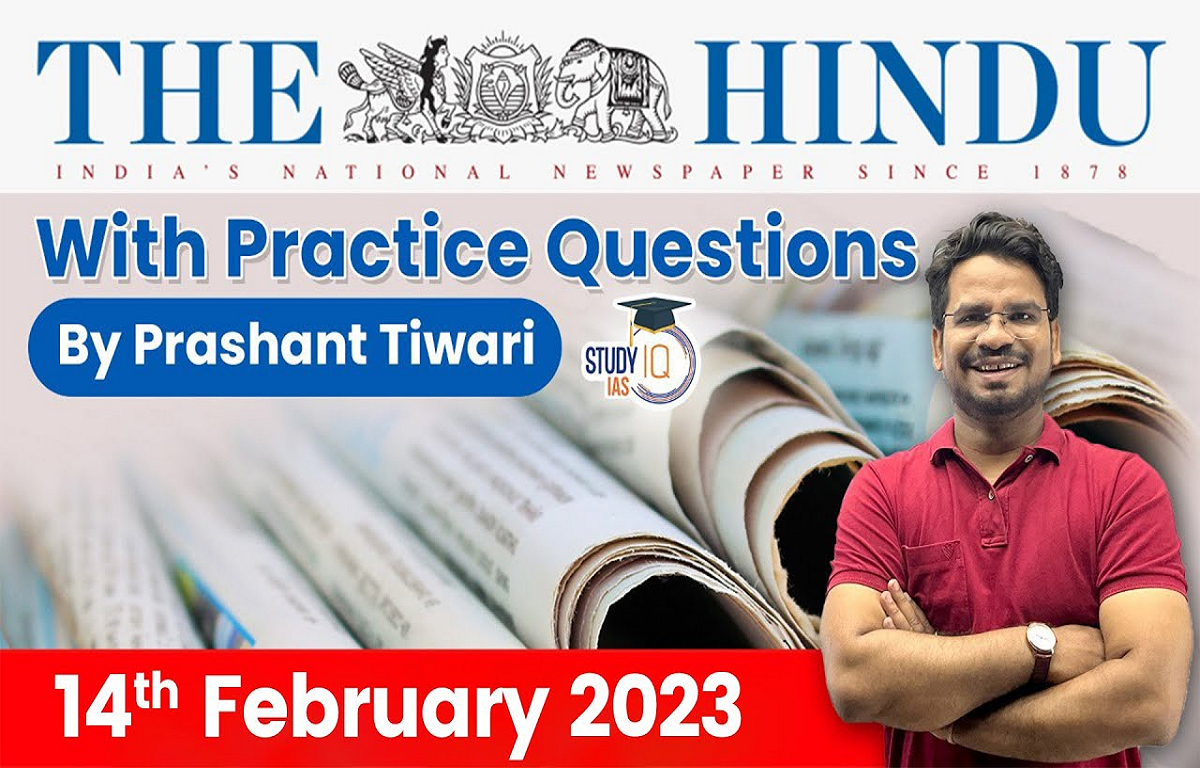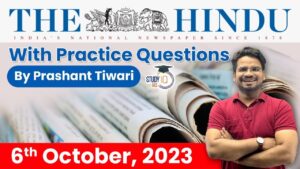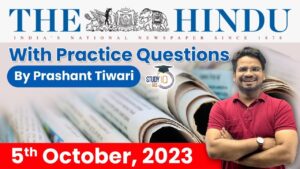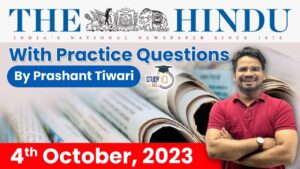The Hindu Newspaper Analysis for UPSC

The Hindu Newspaper Analysis 13 February 2023
- The Supreme Court on Monday dismissed a challenge to the constitution of the Jammu and Kashmir Delimitation Commission to readjust constituencies in the new Union Territory.
- “Articles 2 and 3 of the Constitution enable the Parliament to create new States and Union territories. Accordingly, the two new Union territories have been created.
- The J&K Reorganisation Act which created the two new Union territories assigns the role of readjustment of constituencies to the Delimitation Commission under the Delimitation Act, 2002… a law made under Article 3 can always provide for readjustment of the Constituencies in the newly constituted States or Union territories through the Delimitation Commission.
- Delimitation became necessary when the Jammu and Kashmir Reorganisation Act, 2019 increased the number of seats in the Assembly.
- The erstwhile J&K state had 111 seats — 46 in Kashmir, 37 in Jammu, and four in Ladakh — plus 24 seats reserved for Pakistan-occupied Kashmir.
- When Ladakh was carved out as a Union Territory, J&K was left with 107 seats, including the 24 for PoK. The Reorganisation Act increased the seats to 114 — 90 for Jammu & Kashmir, besides the 24 reserved for PoK.
- The Commission is chaired by retired Supreme Court judge Ranjana Prakash Desai comprising two other ex-officio members and five Lok Sabha MPs from J&K nominated by the Lok Sabha Speaker as Associate Members.
- What is Delimitation?
- It is the act or process of fixing limits or boundaries of territorial constituencies in a country or a province having a legislative body for electoral purposes.
Delimitation Commission:
- The job of delimitation is assigned to the Delimitation Commission or a Boundary Commission.
- The Delimitation Commission in India is a high-power body whose orders have the force of law.
- Its orders cannot be called in question before any court.
- These orders come into force on a date to be specified by the President of India on this behalf.
- Constitutional Provisions:
- Article 82: This provides the Parliament with the authority to enact a Delimitation Act after every Census.
- Article 170: This provides for the States to get divided into territorial constituencies as per the Delimitation Act after every Census.
Functions:
- To determine the number and boundaries of constituencies in a way that the population of all seats, so far as practicable, is the same.
- Identifying seats reserved for Scheduled Castes and Scheduled Tribes wherever their population is relatively large.
- In case of difference of opinion among members of the Commission, the will of majority prevails.

- Context – The expunction of portions of the speeches made by some Opposition politicians in Parliament recently is an issue that has sparked off a debate on an action taken by the Speaker (in the speech by Congress leader Rahul Gandhi), and the Chairman of the Rajya Sabha (in the case of the speech made by Congress President and Leader of Opposition in the Rajya Sabha Mallikarjun Kharge).
- When such a motion is discussed, MPs are generally permitted to speak on anything under the sun.
- Article 105 of the Constitution confers on members, freedom of speech in the House and immunity from interference by the court for anything said in the House.
- Rule 380 of the Rules of procedure of the Lok Sabha and Rule 261 of the Rules of the Rajya Sabha give the power to the presiding officers of these Houses to expunge any words used in the debate which are defamatory, unparliamentary, undignified or indecent. Once expunged they do not remain on record and if anyone publishes them thereafter, they will be liable for breach of privilege of the House.
- There are also occasions when an MP may, during his speech, make an allegation against a fellow MP or an outsider. Rule 353 of the Lok Sabha regulates the procedure in that regard. Under this Rule, the MP is required to give “adequate advance notice” to the Speaker as well as the Minister concerned.
- It may be noted here that the Rule does not prohibit the making of any allegation.
- In this case, it may be noted that the allegation which necessitates advance notice, etc. is of a defamatory or incriminatory nature. It means that if the allegation is neither defamatory nor incriminatory, the above rule would have no application.

- Land subsidence incidents in hilly urban India are becoming increasingly common —an estimated 12.6% of India’s land area is prone to landslides, especially in Sikkim, West Bengal and Uttarakhand.
- Construction in such a landscape is often driven by building bye-laws that ignore local geological and environmental factors. Consequently, land use planning in India’s Himalayan towns and the Western Ghats is often ill-conceived, adding to slope instability.
- Flood risk is the second issue.
- Flood-proofing India’s cities will require multiple measures: urban planners will have to step back from filling up water bodies, canals and drains and focus, instead, on enhancing sewerage and stormwater drain networks. Existing sewerage networks need to be reworked and expanded to enable wastewater drainage in low-lying urban geographies. Protecting “blue infra” areas, i.e., places that act as natural sponges for absorbing surface runoff, allowing groundwater to be recharged, is a must.

- A former judge of the Supreme Court of India and a former Indian Army commander are among the new Governors of States appointed by the Centre on Sunday.
- The institution of the Governor is a legacy of the British imperial governance structure. The legitimacy of a nominated Governor in a democracy was the topic of a heated debate in the Constituent Assembly, but it was carried on into the new republic nevertheless.
- The Governor was to act as a dynamic link between the Centre and the State, but the makers of the Constitution were clear that the posts must remain ornamental, except in very narrowly defined situations in which they were allowed discretion in decision-making.

- Jal Jeevan Mission (JJM), The aim here is to provide piped water to every rural household by 2024.
- So far, only the States of Goa, Gujarat, Haryana and Telangana have reported 100% coverage of eligible households with piped water, with Punjab and Himachal Pradesh nearly there at over 97%. Excluding these, only 10 other States or Union Territories have reported over 60% coverage. Large, populous States such as Uttar Pradesh and Rajasthan have reported only 30% coverage, and Madhya Pradesh, around 47%.
- A fully functional tap water connection is defined as a household getting at least 55 litres of potable water per capita per day all through the year; however, local reports suggest that despite having a tap connection, several village households revert to their local groundwater resources as the quality of supplied tap water is inadequate.

- A Constitution is the basic law that lays the foundation for the governance of a country.
- In B.R. Kapur v. State of Tamil Nadu (2001), the Governor’s appointment of Jayalalithaa as Chief Minister despite her conviction for a criminal offence was called in question. Article 164(1) of the Constitution does not prescribe any disqualification for the appointment of a Chief Minister. Article 173, however, disqualifies a person with prior conviction from being a member of the Legislature.
- The Governor… is sworn to preserve, protect and defend the Constitution and the laws (Article 159).
- The oath to be taken by a judge of a High Court under Schedule III of the Constitution requires a declaration of allegiance to the Constitution and performance of duties “without fear or favour, affection or ill-will”.

- The data points published on January 23 and February 1 showed that the maths skills and reading skills of rural school students in the southern and western States were impacted the most due to COVID-19.
- Further reading of the Annual Status of Education Report (2022) shows that in many southern and western States, the share of children taking paid private tuition classes reduced after the COVID-19 outbreak, while it increased in all other regions.
- In States where the coaching culture was already prevalent and in regions where children began attending private classes from an early age, the increase in the share of students who took tuitions was much sharper post-pandemic.
- in all States (except Kerala and West Bengal), the share of private school students who took paid tuitions was higher, showing that the richer classes were able to manage the pandemic-forced learning losses better compared to poorer households.

- Prime Minister Narendra Modi will inaugurate TRIFED’s Aadi Mahotsav festival on Thursday at Major Dhyan Chand Stadium in New Delhi, Tribal Affairs Minister Arjun Munda said on Monday.
- The Aadi Mahotsav is TRIFED’s (Tribal Cooperative Marketing Development Federation of India Ltd.) flagship event which will feature the exhibition-cum-sale of tribal handicrafts, handloom, paintings, jewellery, cane and bamboo, pottery, food, natural products, and tribal cuisine among many artefacts at over 200 stalls inside the stadium.
- Munda added that more than 1,000 tribal artisans and artists from 28 States and UTs will take part in the festival.
- Aadi Mahotsav is a national tribal festival and a joint initiative of Ministry of Tribal Affairs, Government of India & Tribal Cooperative Marketing Development Federation of India (TRIFED).
- TRIFED came into existence in 1987. It is a national-level apex organization functioning under the administrative control of Ministry of Tribal Affairs, Govt. of India.
- TRIFED has its registered and Head Office located in New Delhi and has a network of 13 Regional Offices located at various places in the country.
- The ultimate objective of TRIFED is socio-economic development of tribal people in the country by way of marketing development of the tribal products.
- The festival showcases traditional art and handicrafts and cultural heritage of the country.
Q) ‘Operation Dost’, is a search and rescue operation launched by India in which one of the following countries?
- Yemen
- Sri Lanka
- Turkey
- Ukraine
‘ऑपरेशन दोस्त’, भारत द्वारा निम्नलिखित में से किस देश में शुरू किया गया एक खोज और बचाव अभियान है?
- यमन
- श्रीलंका
- तुर्की
- यूक्रेन
Explanation :
- India has launched ‘Operation Dost’ to extend assistance to Turkey and Syria, the nations hit by an intense 7.9-magnitude earthquake.
About Operation Dost:
- It is an ongoing search and rescue mission initiated by the Government of India to help Syria and Turkey, after they witnessed a massive earthquake that left thousands dead, injured and trapped under the rubble.
- Under operation dost, India has sent search and rescue teams, mainly teams of the National Disaster Response Force (NDRF), materials, medicines, medical equipment and consumables to Turkey and Syria.
- The NDRF teams comprise dog squad, medicines, blankets, four wheelers.
- The Indian Army’s team of medical specialists is providing relief to the injured at a field hospital set up in Turkey’s Hatay. The hospital is running with medical, surgical and emergency wards.
Q) With reference to Dayanand Saraswati, consider the following statements:
- He wrote the Satyarth Prakash book.
- He established the Brahmo samaj to reform the Vedic dharma.
Which of the above statements is/are Incorrect?
- 1 only
- 2 only
- Both 1 and 2
- Neither 1 nor 2
दयानंद सरस्वती के संदर्भ में निम्नलिखित कथनों पर विचार कीजिये:
- उन्होंने सत्यार्थ प्रकाश पुस्तक लिखी।
- उन्होंने वैदिक धर्म में सुधार के लिए ब्रह्म समाज की स्थापना की।
उपरोक्त में से कौन सा/से कथन गलत है/हैं?
- केवल 1
- केवल 2
- 1 और 2 दोनों
- न तो 1 और न ही 2
Explanation :
Prime Minister of India will inaugurate the year-long celebrations commemorating the 200th birth anniversary of Maharishi Dayanand Saraswati, at Indira Gandhi Indoor Stadium, Delhi.
- Swami Dayanand Saraswati was a philosopher, social leader and founder of the Arya Samaj, a reform movement of Vedic dharma.
- He established the Arya Samaj on April 7, 1875, in Bombay — with 10 principles that are beautifully based purely on God, soul and nature.
- This organisation brought about immense changes in the religious perceptions of Indians.
- He was the first to give the call for Swaraj as “India for Indian” in 1876.
- One of his most influential works is the book Satyarth Prakash, which contributed to the Indian independence movement.
Q) With reference to the Geological Survey of India, consider the following statements:
- The main functions of this organization is to update national geo-scientific information and mineral resource assessment.
- It works under the Ministry of Mines.
Which of the above statements is/are correct?
- 1 only
- 2 only
- Both 1 and 2
- Neither 1 nor 2
भारतीय भूवैज्ञानिक सर्वेक्षण के संदर्भ में निम्नलिखित कथनों पर विचार कीजिये:
- इस संगठन का मुख्य कार्य राष्ट्रीय भू-वैज्ञानिक जानकारी और खनिज संसाधन मूल्यांकन को अद्यतन करना है।
- यह खान मंत्रालय के अधीन कार्य करता है।
उपरोक्त कथनों में से कौन-सा/से सही है/हैं?
- केवल 1
- केवल 2
- 1 और 2 दोनों
- न तो 1 और न ही 2
Explanation :
The Geological Survey of India (GSI) will be taking up 111 public -health and public good geoscience activities during 2023-24.
- It was set up in 1851 primarily to find coal deposits for the Railways.
- Over the years, it has grown into a repository of geo-science information required in various fields in the country.
- The main functions of the GSI relate to the creation and updation of national geoscientific information and mineral resource assessment.
- Presently, GSI is an attached office to the Ministry of Mines.
- It is headquartered in Kolkata and has six regional offices located at Lucknow, Jaipur, Nagpur, Hyderabad, Shillong and Kolkata. Every state has a state unit.
Q) With reference to the Dawoodi Bohra Community, consider the following statements:
- The members of this community belong to the Shia sect.
- They speak Lisan al-Dawat, a language which is a combination of Arabic and Urdu.
Which of the above statements is/are correct?
- 1 only
- 2 only
- Both 1 and 2
- Neither 1 nor 2
दाऊदी बोहरा समुदाय के संदर्भ में निम्नलिखित कथनों पर विचार कीजिये:
- इस समुदाय के सदस्य शिया संप्रदाय के हैं।
- वे लिसान अल-दावत बोलते हैं, जो एक ऐसी भाषा है जो अरबी और उर्दू का संयोजन है।
उपरोक्त कथनों में से कौन-सा/से सही है/हैं?
- केवल 1
- केवल 2
- 1 और 2 दोनों
- न तो 1 और न ही 2
Explanation :
The Supreme Court recently referred a petition challenging the constitutional validity of the practice in the Dawoodi Bohra community to excommunicate members, to the nine-judge bench.
- The Dawoodi Bohras are members of the Muslim community’s Shia sect.
- In India, they are located mainly in Gujarat and were traditionally shopkeepers and traders.
- The main language of the community is Lisan al-Dawat, a dialect of Gujarati with inclusions from Arabic and Urdu.
- The leader of the community is known as the Al-Dai-Al-Mutlaq.
Q) The Yanomami tribe, which was recently seen in the news resides in the:
- Amazon forest
- Sahara Desert
- Arctic Region
- None of these
यानोमामी जनजाति, जिसे हाल ही में समाचारों में देखा गया था, निवास करती है:
- अमेज़न के जंगल
- सहारा मरुस्थल
- आर्कटिक क्षेत्र
- इनमें से कोई नहीं
Explanation :
The Brazilian government has recently taken action to remove illegal miners from the largest Indigenous reserve in the Amazon forest where the Yanomami people live.
- The Yanomami tribe is a group of indigenous people who live in an area spanning the border region between Venezuela (Orinoco River basin) and Brazil.
- They are also called South American Indians.
- They speak the Xirianá language.
- Economy and Occupation: They are foraging horticulturists who depend on shifting cultivation, the gathering of fruits, banana cultivation, hunting, etc., for their livelihood.
Mains Practice Question:
Q) Green hydrogen is being termed the fuel of the future. Critically analyse (150 words)
ग्रीन हाइड्रोजन को भविष्य का ईंधन कहा जा रहा है। समालोचनात्मक विश्लेषण करें (150 शब्द)


 The Hindu Newspaper Analysis 6 October 2...
The Hindu Newspaper Analysis 6 October 2...
 The Hindu Newspaper Analysis 5 October 2...
The Hindu Newspaper Analysis 5 October 2...
 The Hindu Newspaper Analysis 4 October 2...
The Hindu Newspaper Analysis 4 October 2...





















